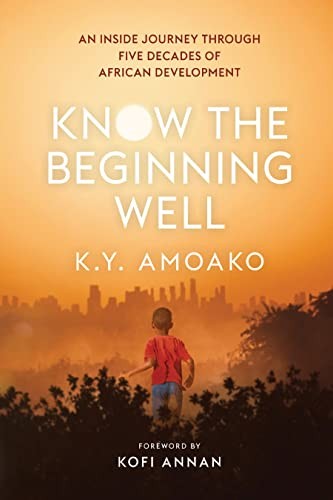Know The Beginning Well
Lifelong development worker, K. Y. Amoako reflects on a career with the World Bank and United Nations in "Know the Beginning Well: An Inside Journey Through Five Decades of African Development" (2020). The book is interesting in that the author shares inside views, but lacks critical reflection and does not offer any bold or new calls on 'the development question'. A few notes:
"The issue of racism and discrimination in the World Bank predated my arrival and outlasted my departure. I've mentioned the difficult environment that Africans faced in the 1970s, but the truth is that people of color - whether born in Africa, America, or anywhere else - have always had a tough time reaching the Bank's highest levels. According to data compiled for an internal review in 2003 and reported by the Washington based government accountability project in 2009, Black Bank employees were 36 present less likely to hold a managerial grade relative to equally qualified, non-black employees. Numbers like these are indicative of a pervasive imbalance, which the Bank has taken increasing steps to address: a racial equality program in 1998, an office in diversity program in 2001, and a code of conduct in 2009 that addressed discrimination and diversity, still the issue persists." (p. 45)
"Kofi Annan turned toward Meles and spoke before anyone else could. "I'm sure some men in your cabinet turn out to be incompetent," he said. "Why not give women a chance? they have a right to be incompetent too." (p. 237)
"He looked back at the most powerful men at the IMF and World Bank and told them point-black that African countries disliked working with their institutions - but had no choice. "Gentleman," he added, "if we were not poor, we would not come to you for help." That acknowledgement, a surprisingly raw statement that no one saw coming, summed up years of frustration for policymakers in developing African countries: without external lending and aid, there can be no long term development-but at what point will lenders start treating borrowers as partners and not beggars?" (p. 381)
"I issued a special invitation to Ethiopian Prime Minister Meles Zenawi, an exceptionally thoughtful and forthright leader. True to his reputation, Meles deconstructed a litany of problems with the onerous business of donor assistance: the bureaucratic requirements, the contradictory conditions, the lack of clear criteria for compliance, the process of trying aid to the purchase of goods and services from donor countries, and the practice of seeking political influence through assistance. All these issues and more imperilled the effective use of aid, Meles argued, and they needed to be addressed alongside any discussion of ODA flows. His ultimate point was that donor accountability for development financing meant so much more than big commitments." (p. 395-396)

